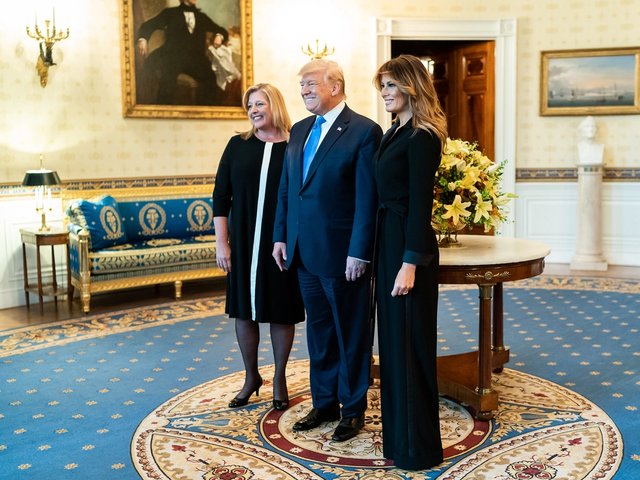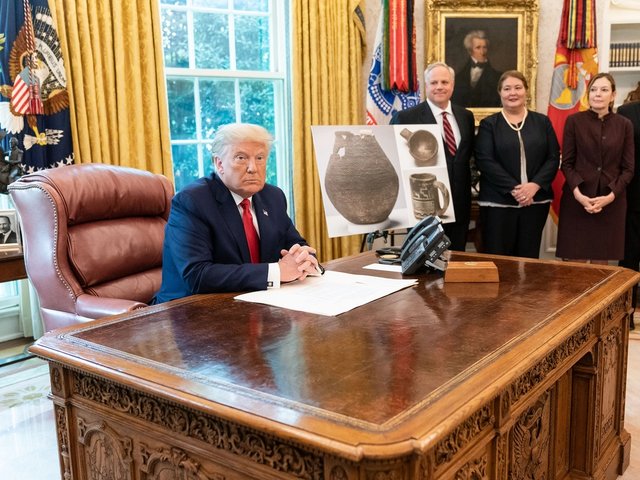The Federation of State Humanities Councils and the Oregon Council for the Humanities have filed a federal lawsuit against US President Donald Trump and billionaire Elon Musk's Department of Government Efficiency (Doge) in an effort to reverse funding cuts and revoked National Endowment for the Humanities (NEH) grants.
The suit, which was filed in Portland, Oregon on 15 May, decries the “screeching halt” the Trump administration's Doge imposed in March and April when it “gutted the National Endowment for the Humanities (NEH) and terminated almost all grants issued to the state and jurisdictional councils by the prior administration”. The NEH has provided more than $6bn in grants to universities, museums, libraries and other cultural organisations across the US since its founding in 1965.
In their complaint, the plaintiffs implore the court to "stop this imminent threat to our nation’s historic and critical support of the humanities by restoring funding appropriated by Congress”. They add that the lawsuit seeks to undo “the disruption and attempted disruption, spearheaded by Doge, of the congressionally established federal-state partnership” between the NEH and the jurisdictional humanities councils like the Oregon Council for the Humanities and similar entities in every state and US territory.
The suit argues that Doge and the NEH (also named as a defendant) exceeded their authority in terminating congressionally-mandated funding streams in the wake of Doge's decision to lay off more than 80% of the NEH's staff in April on Trump’s orders. The suit also seeks the restoration of these funding streams, emphasising that smaller organisations will not be able to fulfill their duties without federal grants.
“Federal dollars from NEH flow through the state and jurisdictional humanities councils to community organisations in nearly every county in the country,” Phoebe Stein, the president of the Federation of State Humanities Councils, said in a statement. “State and jurisdictional humanities councils help veterans heal, teach children to read skillfully and think critically, and provide grants to community projects that simply would not happen without these resources. Even the loss of one humanities council would be one too many in what has been a powerful network serving the American public.”
The Oregon Council for the Humanities' budget was slashed by 45% as a result of the federal grants' cancellations, causing the agency to lay off two employees and move all others to part-time. Adam Davis, the organisation's executive director, told KGW8: "The lawsuit is principally about the fact that the executive [branch of government] has overstepped and tried to undo what Congress is obligated to do and has chosen to do for over 50 years.”
In an executive order on 5 May, Trump called for the complete elimination of the National Endowment for the Arts (NEA), as he had previously done for the NEH and the Institute of Museum and Library Services (IMLS), measures aimed at downsizing the federal government and ending diversity, equity and inclusion (DEI) initiatives. The president's executive orders have also targeted the Smithsonian Institution, which operates more than 20 museums and the National Zoo, and receives about two thirds of its annual operating budget of more than $1bn from funding appropriated by Congress.
The Oregon lawsuit is just one of many that have been filed against the Trump administration. On 6 May, a federal judge granted a legal injunction to 21 states that had sued the president in order to block the dismantling of the IMLS, the Minority Business Development Agency and the Federal Mediation and Conciliation Service, stating that Trump’s executive order had violated the Administrative Protection Act. A separate lawsuit is also underway to stop the dissolution of the IMLS from the American Library Association and the American Federation of County and Municipal Employees, the largest union of museum and library workers. The Author’s Guild also filed a lawsuit to reverse the mass cancellation of government grants by Doge.







